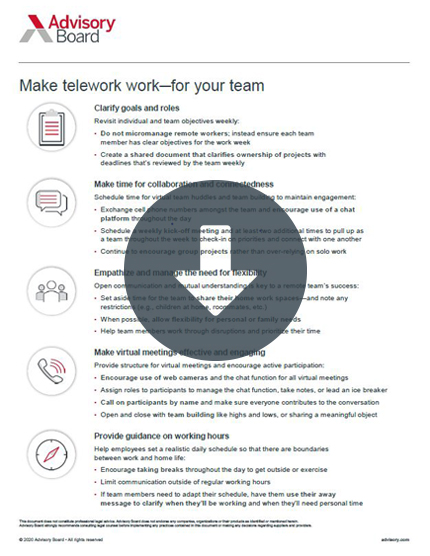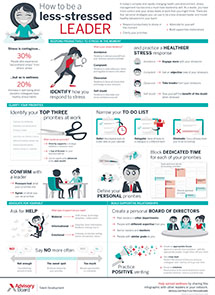Auto logout in seconds.
Continue LogoutEditor's note: This popular story from the Daily Briefing's archives was republished on Jan. 7, 2021.
Many people believe procrastination is a result of poor time management—but psychology experts say the problem is firmly rooted in ones emotions, Charlotte Lieberman reports for the New York Times.
Cheat sheet: 5 tips to make telework work for your team
Why we procrastinate
According to Lieberman, procrastinating on an important work or personal task by say organizing your spice cabinet, does not stem from laziness or poor time management. Instead, experts say the root cause is emotional; it's a way to cope with complex emotions or negative moods that the task you're delaying imparts.
As Tim Pychyl, a professor of psychology and a member of the Procrastination Research Group at Carleton University in Canada, put it, "Procrastination is an emotion regulation problem, not a time management problem." He noted that his research has shown procrastination stems from "the immediate urgency of managing negative moods."
The specifics of those negative moods vary by situation. It could have something to do with the task itself, or it could be related to deeper feelings about the task, including low self-esteem or self-doubt, Lieberman writes.
While experts say delaying those unwelcome tasks can exasperate negative feelings in the long run, people continue to procrastinate to achieve the momentary feeling of relief. When you put off a task, you feel relieved, as "you've been rewarded for procrastinating," according to Fuschia Sirois, professor of psychology at the University of Sheffield in England. As a result, procrastinating can turn into habit, because once we're rewarded for something, we tend to continue doing it.
Compounding that problem is a phenomenon called the "amygdala hijack," in which our amygdala—the part of the brain that perceives threats—sees a task that makes us feel anxious as a real threat. Even if we know that procrastinating will make us feel worse in the future, our brains are wired to care more about removing the "threat" of the task we're putting off, Lieberman writes.
5 ways to stop procrastinating
So if your brain and your emotions are working against you, how do you break the habit of procrastinating?
The first step, Lieberman writes, is to acknowledge the role emotions play in procrastinating—and to break the reward cycle procrastination offers.
Judson Brewer, director of research and innovation at Brown University's Mindfulness Center, said, "Our brains are always looking for relative rewards. If we have a habit loop around procrastination but we haven't found a better reward, our brain is just going to keep doing it over and over until we give it something better to do." So to change our habit, we need to give our brain a "bigger better offer," Brewer said.
With that in mind, Lieberman outlines five ways to better manage your emotional response and stop procrastinating.
1. Take a moment to explore your emotions: When you're on the verge of putting off an important task, Lieberman writes it's a good time to pause and explore what you're feeling in the moment. Ask yourself, "What feelings are eliciting your temptation?" Lieberman writes. "How are the sensations in your body shifting as you continue to rest your awareness on them?"
2 Focus on the "next action": Once you've established that emotional awareness you can focus on the task at hand—but it's important not to focus on the entire task. Pychyl likens this process to method acting; you should ask yourself, "What's the next action I'd take on this if I were going to do it?" According to Pychyl, this helps calm nerves by allowing for "a layer of self-deception"—and often motivation to complete the action will follow.
3 Make it harder to procrastinate: According to Gretchen Rubin, author of "Better Than Before: What I learned About Making and Breaking Habits," making your temptations as inconvenient as possible can help you avoid them. For example, if you frequently procrastinate on social media, delete the app from your phone or "give yourself a really complicated password with not just five digits, but 12," Rubin said. Similarly, you can make the tasks you want to do easier, Rubin said.
4. Forgive yourself: One way to reduce procrastinating is to forgive yourself when you do procrastinate, Lieberman writes. A 2010 study found that students who could forgive themselves for procrastinating while studying for one exam procrastinated less for the second exam. The researchers concluded that self-forgiveness allows "the individual to move past their maladaptive behavior and focus on the upcoming examination without the burden of past acts."
5. Be compassionate with yourself: In other words, "treating ourselves with kindness and understanding in the face of our mistakes and failures," Lieberman writes. A 2012 study by Sirois found that people who procrastinate tend to have high stress and low self-compassion, which suggests that self-compassion provides "a buffer against negative reactions to self-relevant events" (Lieberman, New York Times, 3/25).
Cheat sheet: 5 tips to make telework work for your team

As Covid-19 forces more of the workforce to work remotely, leaders need to keep their teams engaged and productive. Use these tips to manage your remote team
Don't miss out on the latest Advisory Board insights
Create your free account to access 1 resource, including the latest research and webinars.
Want access without creating an account?
You have 1 free members-only resource remaining this month.
1 free members-only resources remaining
1 free members-only resources remaining
You've reached your limit of free insights
Become a member to access all of Advisory Board's resources, events, and experts
Never miss out on the latest innovative health care content tailored to you.
Benefits include:
You've reached your limit of free insights
Become a member to access all of Advisory Board's resources, events, and experts
Never miss out on the latest innovative health care content tailored to you.
Benefits include:
This content is available through your Curated Research partnership with Advisory Board. Click on ‘view this resource’ to read the full piece
Email ask@advisory.com to learn more
Click on ‘Become a Member’ to learn about the benefits of a Full-Access partnership with Advisory Board
Never miss out on the latest innovative health care content tailored to you.
Benefits Include:
This is for members only. Learn more.
Click on ‘Become a Member’ to learn about the benefits of a Full-Access partnership with Advisory Board
Never miss out on the latest innovative health care content tailored to you.

